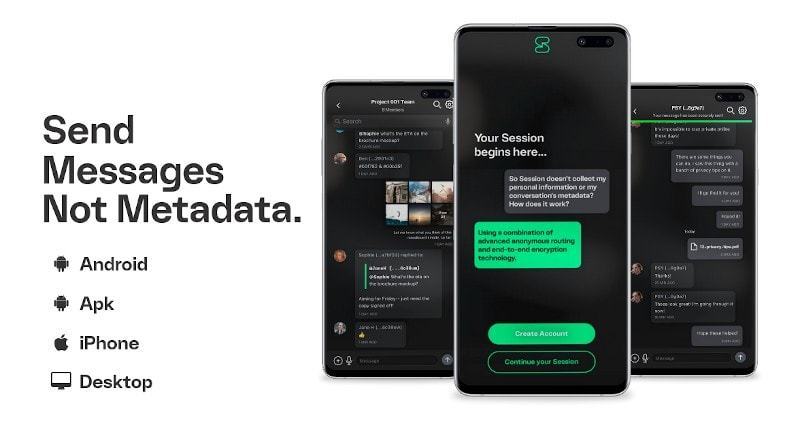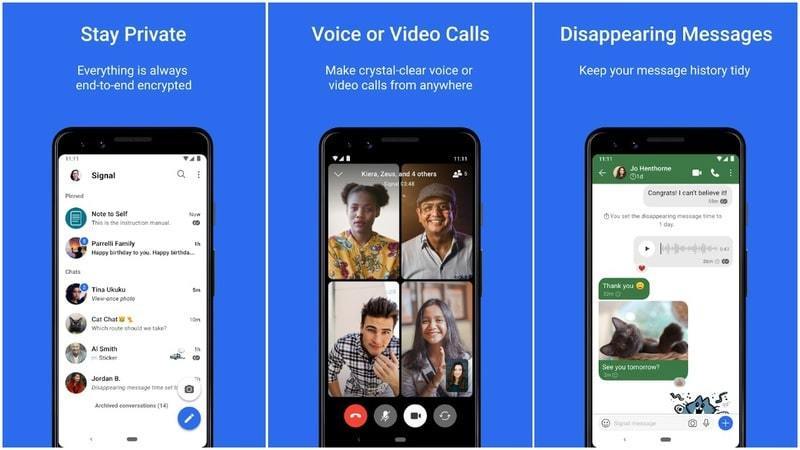After the latest WhatsApp privacy policy updates, many users who trusted the service seem to be making the switch to alternatives like Signal.
Even though WhatsApp tries to clarify and re-assure the change in the policies, users have made their mind while considering the benefits of using privacy alternatives to WhatsApp.
But, what are some useful and impressive alternatives to WhatsApp? In this article, let us take a look at some of the best options.
Private messengers that do not violate your privacy

There could be plenty of private messaging services. I have kept my focus on messaging services with the following criteria in mind:
- Mobile and desktop availability
- Group chats and channels
- Voice and video calls
- Emojis and sticker support
- Privacy and encryption
Basically, private messaging app that cater to the need of a common user.
1. Session

Key Features:
- End-to-end Encryption
- Blockchain-based
- Decentralized
- Does not require phone number
- No data collected by Session
- Lets you create and manage open/closed groups (open groups are public channels)
- Voice messages
- Cross-platform with desktop apps
- Open-Source
Session is technically a fork of Signal and tries to go one step further by not requiring phone numbers. It isn’t a typical WhatsApp replacement but if you want something different with privacy options, this could be it.
You will have to create a Session ID (that you can share to add contacts or ask your contacts to share theirs). If you delete the app, you will lose your ID, so you need to keep your recovery pass safely.
Unlike Signal, it does not rely on a centralized server but blockchain-based, i.e. decentralized. That’s good for reliability technically, but I’ve noticed some significant delays in sending/receiving messages.
If you’re tech-savvy, and want the absolute best for privacy, this could be it. But, it may not be a great option for elders and general consumers. For more information, you can check out my original Session overview.
2. Signal

Key Features:
- End-to-End encryption
- Almost no data collection (Except your phone number)
- Supports Emojis and Stickers
- Lets you create and manage Groups
- Voice/Video calling supported
- Cross-platform support with desktop apps
- Open-Source
Signal is my personal favorite when it comes to privacy alternatives to WhatsApp. I’ve made the switch for years, but I didn’t have all my contacts in Signal. Fast-forward to 2021, I have most of my contacts on Signal.
Signal is the best blend of open-source and privacy. They’ve improved a lot over the years and is safe to assume as a perfect alternative to WhatsApp. You get almost every essential feature compared to WhatsApp.
However, just because it does not store your data, you may not be able to access all the messages of your smartphone on Desktop. In addition to that, it relies on local backup (which is protected by a passphrase) instead of cloud backups. So, you will have to head to the settings, start the backup, safely copy the passcode of the backup, check where the local backup gets stored, and make sure you don’t delete it.

9 Decentralized, P2P and Open Source Alternatives to Mainstream Social Media Platforms Like Twitter, Facebook, YouTube and Reddit
3. Telegram

Key Features:
- End-to-end Encryption (with Secret chat option)
- Cloud-based (no need to back up your chats, it’s all in the cloud)
- Ability to create public channels
- Create and manage groups
- Voice/Video Call
- Offers a better privacy policy to WhatsApp
- Supports Emojis and Stickers
- Client-side Open-Source
Telegram may not be the best bet for privacy, but it is certainly better than WhatsApp in several regards.
By default, the chats aren’t end-to-end encrypted but the convenience of having all the history in the cloud without needing to backup while having the secret chat option for encryption is a good deal for common consumers.
Not just limited to that, you also get native desktop apps and the client-side apps are open-source.
Of course, I won’t recommend it over others for privacy-conscious users, but sometimes you just need a messenger that works, offers convenience, and respects the user’s privacy even if the chats are stored in the cloud.
4. Threema (Paid)

Key Features:
- End-to-end Encryption
- Does not require a phone number
- Lets you create and manage groups
- Ability to add polls
- Voice/Video calls
- Switzerland-based (known for best privacy policies)
- Cross-platform (with Threema Web for PC, no native desktop apps)
- Open-Source
Threema was among the best choices in the list of private messengers available out there. Initially, it wasn’t open-source, which was a bummer.
But, now, Threema is completely open-source!
Threema offers the best features that you’d always want in a messenger. However, it is a paid-only app.
Of course, if your friends/contacts do not mind paying for one of the best privacy alternatives to WhatsApp, you can easily recommend them this!
5. Element

Key Features:
- End-to-end Encryption
- Does not require phone number
- Supports creating large public groups and closed groups as well
- Utilizes Decentralized Matrix network
- Voice/Video Calls
- Cross-platform with desktop apps
- Open-Source
Element is yet another fantastic WhatsApp alternative that is built keeping privacy in mind. It may not be a perfect replacement for a few contacts but if you’re looking for an “All in One” platform for personal messaging and work as well, Element can be the perfect pick.
It was originally known as Riot, and then it rebranded to Element. Do note that it can be a little overwhelming if you wanted a simple alternative, but it’s great for privacy and security.
With the transparent policy updates to WhatsApp, more users are getting aware about the disadvantages of using a product owned by big tech companies. Hence, we need WhatsApp alternatives more than ever.
Of course, it is not easy to switch and convince other less tech-savvy users. But, it is certainly worth it.
What do you think about the best WhatsApp alternatives which offer better privacy? Let me know your thoughts in the comments below.